Unit 7A Day to Remember Section A (2a-2e)课件(共33张PPT,内嵌音频)人教版(2024)七年级下册
文档属性
| 名称 | Unit 7A Day to Remember Section A (2a-2e)课件(共33张PPT,内嵌音频)人教版(2024)七年级下册 | 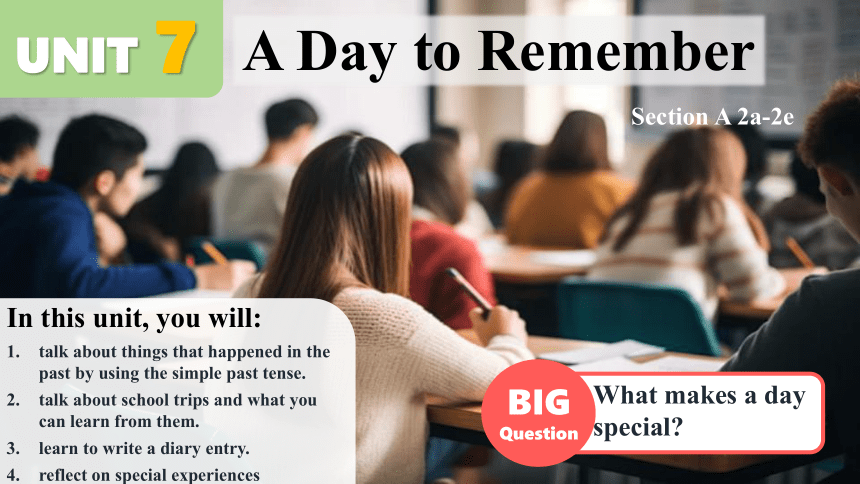 | |
| 格式 | pptx | ||
| 文件大小 | 12.6MB | ||
| 资源类型 | 教案 | ||
| 版本资源 | 人教版 | ||
| 科目 | 英语 | ||
| 更新时间 | 2025-05-30 20:33:06 | ||
图片预览

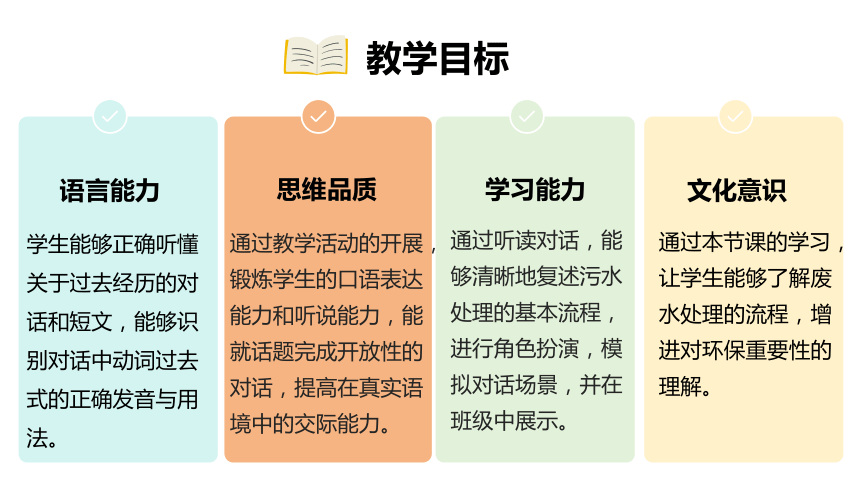
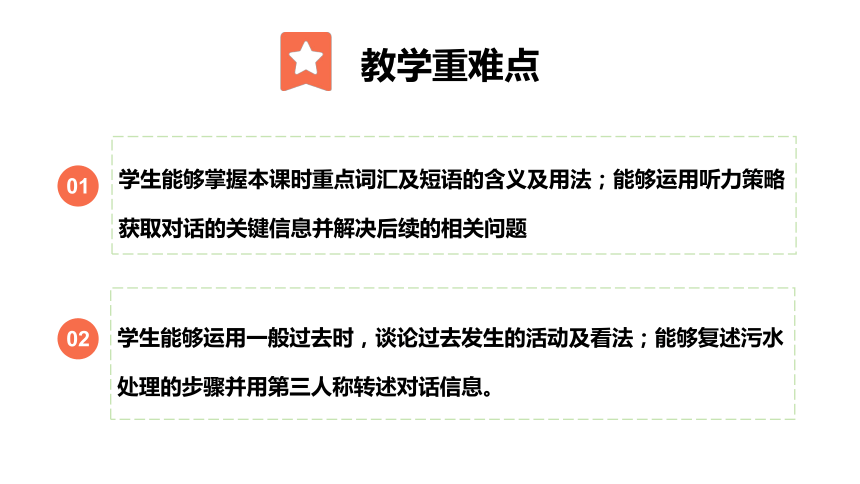
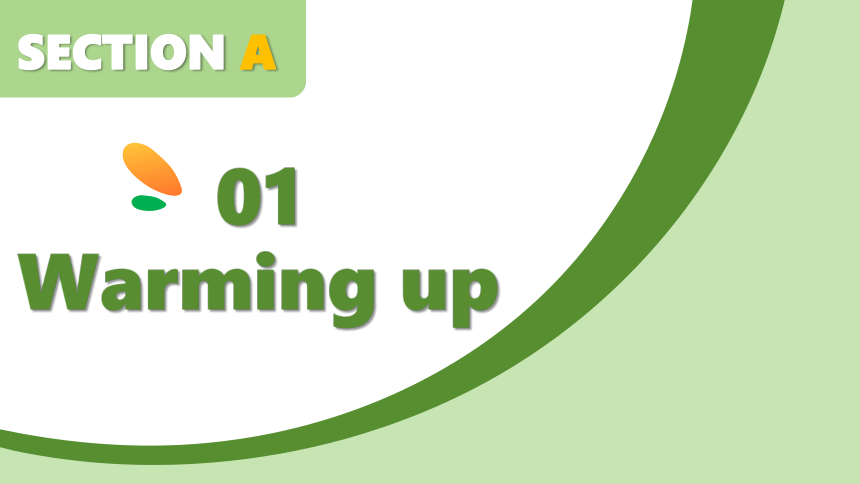
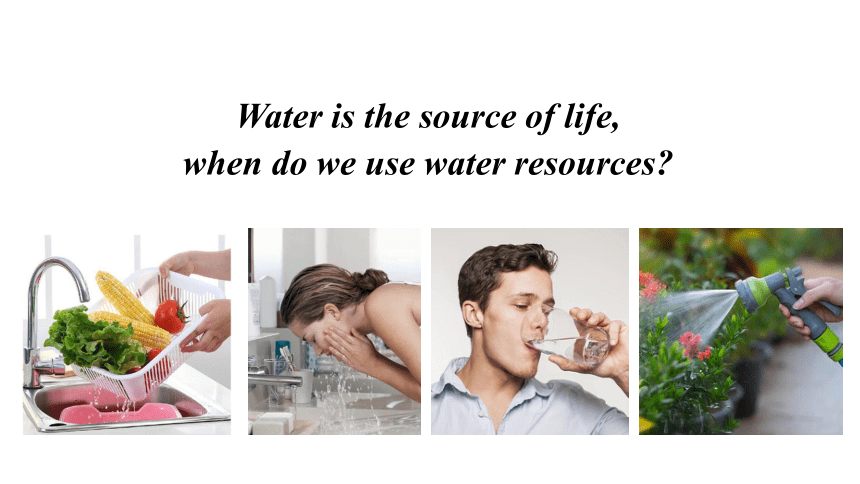
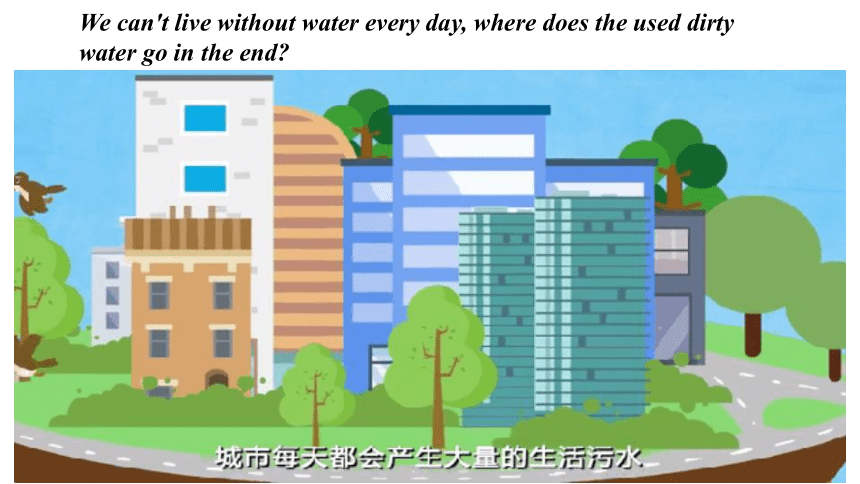
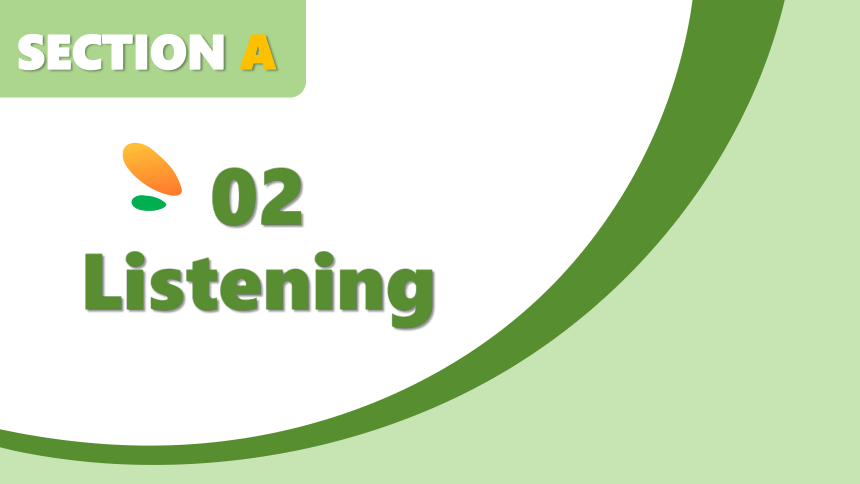
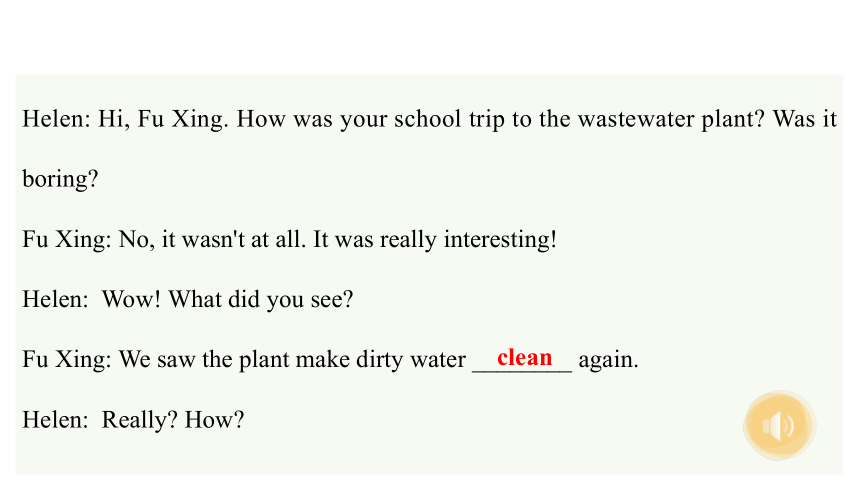
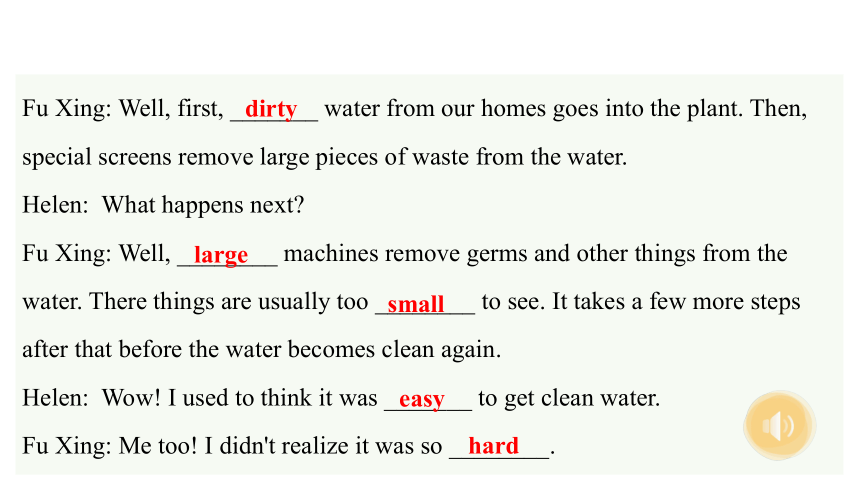

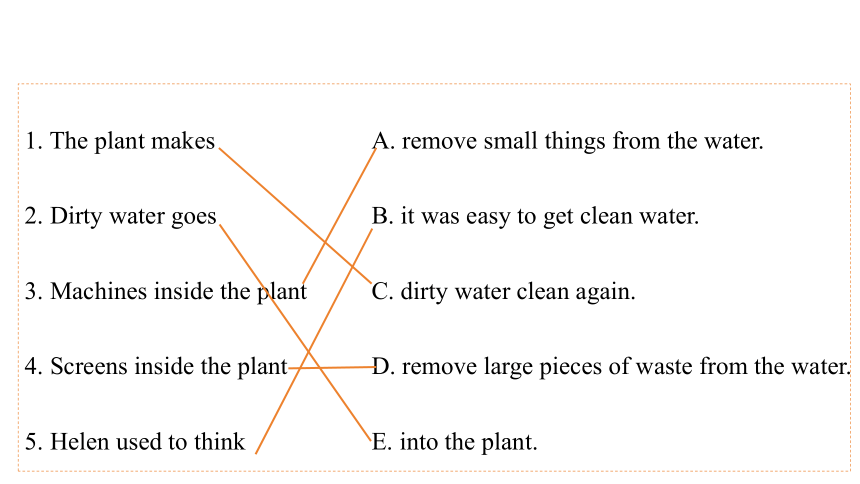
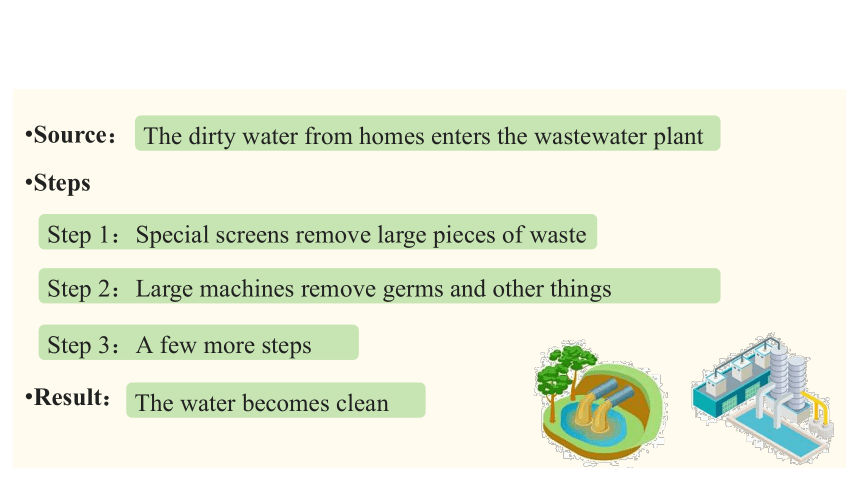
文档简介
(共33张PPT)
In this unit, you will:
talk about things that happened in the past by using the simple past tense.
talk about school trips and what you can learn from them.
learn to write a diary entry.
reflect on special experiences
A Day to Remember
UNIT 7
BIG
Question
What makes a day
special
Section A 2a-2e
思维品质
学习能力
文化意识
语言能力
教学目标
学生能够正确听懂关于过去经历的对话和短文,能够识别对话中动词过去式的正确发音与用法。
通过教学活动的开展,锻炼学生的口语表达能力和听说能力,能就话题完成开放性的对话,提高在真实语境中的交际能力。
通过听读对话,能够清晰地复述污水处理的基本流程,进行角色扮演,模拟对话场景,并在班级中展示。
通过本节课的学习,让学生能够了解废水处理的流程,增进对环保重要性的理解。
学生能够掌握本课时重点词汇及短语的含义及用法;能够运用听力策略获取对话的关键信息并解决后续的相关问题
学生能够运用一般过去时,谈论过去发生的活动及看法;能够复述污水处理的步骤并用第三人称转述对话信息。
01
02
教学重难点
01
Warming up
SECTION A
Free Talk
Water is the source of life,
when do we use water resources
We can't live without water every day, where does the used dirty
water go in the end
02
Listening
SECTION A
Listen to the conversation and fill in the blanks
with correct adjectives.
2a
Helen: Hi, Fu Xing. How was your school trip to the wastewater plant Was it boring
Fu Xing: No, it wasn't at all. It was really interesting!
Helen: Wow! What did you see
Fu Xing: We saw the plant make dirty water ________ again.
Helen: Really How
clean
Listen to the conversation and fill in the blanks
with correct adjectives.
2a
Fu Xing: Well, first, _______ water from our homes goes into the plant. Then, special screens remove large pieces of waste from the water.
Helen: What happens next
Fu Xing: Well, ________ machines remove germs and other things from the water. There things are usually too ________ to see. It takes a few more steps after that before the water becomes clean again.
Helen: Wow! I used to think it was _______ to get clean water.
Fu Xing: Me too! I didn't realize it was so ________.
dirty
large
small
easy
hard
Was Fu Xing's school trip to the wastewater plant boring
What did they see at the wastewater plant
Where does the dirty water first go in the wastewater treatment process
What do special screens do in the wastewater treatment process
2a
Listen to the conversation and answer the questions.
No, it wasn't. It was really interesting.
They saw the plant make dirty water clean again.
Dirty water from our homes goes into the plant.
Special screens remove large pieces of waste from the water.
Read the conversation and match the sentence parts.
2b
1. The plant makes
2. Dirty water goes
3. Machines inside the plant
4. Screens inside the plant
5. Helen used to think
A. remove small things from the water.
B. it was easy to get clean water.
C. dirty water clean again.
D. remove large pieces of waste from the water.
E. into the plant.
2a
Retell the steps of wastewater processing.
Source:
Steps
Result:
The dirty water from homes enters the wastewater plant
Step 1:Special screens remove large pieces of waste
Step 2:Large machines remove germs and other things
Step 3:A few more steps
The water becomes clean
Complete the summary of the conversation in 2a.
2c
Last week, Fu Xing’s class went on a school trip to a __________ plant. The plant turned dirty water into clean water. Fu Xing learnt about the cleaning process: First, dirty water goes from people’s __________ to the plant. Then the plant uses screens to remove large pieces of __________ from the dirty water. Next, large __________ clean the water. They remove __________ and other small things. It takes a few more __________ before the water becomes clean again.
homes
waste
machines
germs
steps
wastewater
Listen to the conversation again and pay attention to the pronunciation of was, wasn’t, did, and didn’t.
2d
Helen: Hi, Fu Xing. How was your school trip to the wastewater plant Was it
boring
Fu Xing: No, it wasn’t at all. It was really interesting!
Helen: Wow! What did you see
Fu Xing: We saw the plant make dirty water clean again.
Helen: Really How
Fu Xing: Well, first, dirty water from our homes goes into the plant. Then,
special screens remove large pieces of waste from the water.
Listen to the conversation again and pay attention to the pronunciation of was, wasn’t, did, and didn’t.
2d
Helen: What happens next
Fu Xing: Well, large machines remove germs and other things from the water.
These things are usually too small to see. It takes a few more steps after
that before the water becomes clean again.
Helen: Wow! I used to think it was easy to get clean water.
Fu Xing: Me too! I didn’t realize it was so hard.
Role-play the conversation.
2d
Helen: Hi, Fu Xing. How was your school trip to the wastewater plant Was it boring
Fu Xing: No, it wasn’t at all. It was really interesting!
Helen: Wow! What did you see
Fu Xing: We saw the plant make dirty water clean again.
Helen: Really How
Fu Xing: Well, first, dirty water from our homes goes into the plant. Then, special screens remove large pieces of waste from the water.
Helen: What happens next
Fu Xing: Well, large machines remove germs and other things from the water. These things are usually too small to see. It takes a few more steps after that before the water becomes clean again.
Helen: Wow! I used to think it was easy to get clean water.
Fu Xing: Me too! I didn’t realize it was so hard.
How was your school trip
Where did you go
It was great.
We went to the theatre to watch a show.
Talk about a school trip you took to a special place.
2e
theatre factory zoo museum
farm forest market park
04
Grammar
SECTION A
1
how 引导的特殊疑问句
本课时how引导的特殊疑问句用来询问看法或经历等,回答时可根据情况使用“Its+形容词(good/great/amazing/terrible/...).”。
How did you feel about the school trip to the museum
你对去博物馆的学校旅行感觉如何?
How was your first day at the new school
你在新学校的第一天过得怎么样?
How do you think of the story in this book
你认为这本书里的故事怎么样?
2
waste
n. 废弃物(不可数名词)、浪费(可与冠词a连用)
It's a waste to throw good food away. 把好好的食物扔掉太浪费了。
v. 浪费
waste sth. on sth.浪费某物在某物/事上
waste sth. (in) doing sth.浪费某物做某事
adj. 废弃的,无用的
The waste paper can be recycled. 废纸可以回收利用。
3
plant
v. 种植;栽种
I plant some flowers in my garden every spring.
我每年春天都会在我的花园里种一些花。
n. 植物
There are all kinds of plants in the park.
公园里有各种各样的植物。
n. 工厂
There is a big car plant near my home. 我家附近有一家大型汽车制造厂。
4
step
n. 步骤;措施(可数名词)
We should take steps to protect the environment.
我们应该采取措施保护环境。
n. 脚步;一步(可数名词)
Every small step forward brings us closer to our dream.
往前的每一小步都让我们离梦想更近。
n. 台阶;阶段
I walked down the stone steps to the beach. 我走下石阶,来到海滩上。
5
used to
used to 过去常常;以前经常(后跟动词原形)
used to do sth. 过去经常做某事(描述过去经常发生的事情或存在的状态)
My father used to work there.
我父亲曾在那儿工作过。
be used to do sth. 被用来做某事 (=be used for doing sth.)
be/get used to doing sth.习惯于做某事 (后跟名词、代词、动名词)
Wood is used to make tables and chairs. 木头被用来制作桌椅。
She is used to getting up early. 她习惯于早起。
6
realize
v. 认识到;领会,不用于进行时。其后可接名词、代词或从句作宾语。
I finally realized my mistake.
我终于认识到了自己的错误。
We realized how difficult the task was.
我们认识到这项任务有多难。
v. 实现(主语一般是人,后面常接dream、goal等名词作宾语)
He worked hard and realized his dream of becoming a doctor.
他努力工作,实现了自己成为一名医生的梦想。
05
Exercises
SECTION A
1.—______ you tired after running for ten minutes
—No. I______ feel tired at all.
A. Did; didn't B. Were; wasn't C. Were; didn't D. Did; wasn't
2.—Gina is very outgoing and she likes talking much with you.
—Yes, but she ______ afraid to talk with others.
A. used to being B. was used to being C. used to be D. was used to be
Exercise
Exercise
3.—The cake is very delicious.
—Thank you. My sister______ it last night.
A. make B. made C.is making D. makes
4.—What beautiful flowers!
—Yeah, Grandma______ them two months ago.
A. plants B. is planting C. planted D. will plant
Exercise
5. 你去废水处理厂的学校郊游怎么样
How was your school trip to the __________ __________ ?
6. 昨天我丢了一本书,所以我觉得很难过。
Yesterday I ______ ______ ______, so I felt very sad.
7. 那孩子的去世使我们意识到食品安全的重要性。
The death of the kid _____ _____ _____ the importance of the food safety.
8. 我过去每天放学后都踢足球。
I _____ _____ _____ football every day after school.
wastewater plant
used to play
lost a book
makes us realize
06
Summary
SECTION A
Grammar
how 引导的特殊疑问句
plant
waste
Sentences
How was your school trip
It was great.
Where did you go
We went to the theatre to watch a show.
step
used to
realize
07
Homework
SECTION A
Homework
Review the keywords and sentence structures in today’s lesson.
2. Practice the conversation with your partner.
How was your school trip
It was great.
Where did you go
We went to the theatre to watch a show.
SEE YOU NEXT CLASS!
In this unit, you will:
talk about things that happened in the past by using the simple past tense.
talk about school trips and what you can learn from them.
learn to write a diary entry.
reflect on special experiences
A Day to Remember
UNIT 7
BIG
Question
What makes a day
special
Section A 2a-2e
思维品质
学习能力
文化意识
语言能力
教学目标
学生能够正确听懂关于过去经历的对话和短文,能够识别对话中动词过去式的正确发音与用法。
通过教学活动的开展,锻炼学生的口语表达能力和听说能力,能就话题完成开放性的对话,提高在真实语境中的交际能力。
通过听读对话,能够清晰地复述污水处理的基本流程,进行角色扮演,模拟对话场景,并在班级中展示。
通过本节课的学习,让学生能够了解废水处理的流程,增进对环保重要性的理解。
学生能够掌握本课时重点词汇及短语的含义及用法;能够运用听力策略获取对话的关键信息并解决后续的相关问题
学生能够运用一般过去时,谈论过去发生的活动及看法;能够复述污水处理的步骤并用第三人称转述对话信息。
01
02
教学重难点
01
Warming up
SECTION A
Free Talk
Water is the source of life,
when do we use water resources
We can't live without water every day, where does the used dirty
water go in the end
02
Listening
SECTION A
Listen to the conversation and fill in the blanks
with correct adjectives.
2a
Helen: Hi, Fu Xing. How was your school trip to the wastewater plant Was it boring
Fu Xing: No, it wasn't at all. It was really interesting!
Helen: Wow! What did you see
Fu Xing: We saw the plant make dirty water ________ again.
Helen: Really How
clean
Listen to the conversation and fill in the blanks
with correct adjectives.
2a
Fu Xing: Well, first, _______ water from our homes goes into the plant. Then, special screens remove large pieces of waste from the water.
Helen: What happens next
Fu Xing: Well, ________ machines remove germs and other things from the water. There things are usually too ________ to see. It takes a few more steps after that before the water becomes clean again.
Helen: Wow! I used to think it was _______ to get clean water.
Fu Xing: Me too! I didn't realize it was so ________.
dirty
large
small
easy
hard
Was Fu Xing's school trip to the wastewater plant boring
What did they see at the wastewater plant
Where does the dirty water first go in the wastewater treatment process
What do special screens do in the wastewater treatment process
2a
Listen to the conversation and answer the questions.
No, it wasn't. It was really interesting.
They saw the plant make dirty water clean again.
Dirty water from our homes goes into the plant.
Special screens remove large pieces of waste from the water.
Read the conversation and match the sentence parts.
2b
1. The plant makes
2. Dirty water goes
3. Machines inside the plant
4. Screens inside the plant
5. Helen used to think
A. remove small things from the water.
B. it was easy to get clean water.
C. dirty water clean again.
D. remove large pieces of waste from the water.
E. into the plant.
2a
Retell the steps of wastewater processing.
Source:
Steps
Result:
The dirty water from homes enters the wastewater plant
Step 1:Special screens remove large pieces of waste
Step 2:Large machines remove germs and other things
Step 3:A few more steps
The water becomes clean
Complete the summary of the conversation in 2a.
2c
Last week, Fu Xing’s class went on a school trip to a __________ plant. The plant turned dirty water into clean water. Fu Xing learnt about the cleaning process: First, dirty water goes from people’s __________ to the plant. Then the plant uses screens to remove large pieces of __________ from the dirty water. Next, large __________ clean the water. They remove __________ and other small things. It takes a few more __________ before the water becomes clean again.
homes
waste
machines
germs
steps
wastewater
Listen to the conversation again and pay attention to the pronunciation of was, wasn’t, did, and didn’t.
2d
Helen: Hi, Fu Xing. How was your school trip to the wastewater plant Was it
boring
Fu Xing: No, it wasn’t at all. It was really interesting!
Helen: Wow! What did you see
Fu Xing: We saw the plant make dirty water clean again.
Helen: Really How
Fu Xing: Well, first, dirty water from our homes goes into the plant. Then,
special screens remove large pieces of waste from the water.
Listen to the conversation again and pay attention to the pronunciation of was, wasn’t, did, and didn’t.
2d
Helen: What happens next
Fu Xing: Well, large machines remove germs and other things from the water.
These things are usually too small to see. It takes a few more steps after
that before the water becomes clean again.
Helen: Wow! I used to think it was easy to get clean water.
Fu Xing: Me too! I didn’t realize it was so hard.
Role-play the conversation.
2d
Helen: Hi, Fu Xing. How was your school trip to the wastewater plant Was it boring
Fu Xing: No, it wasn’t at all. It was really interesting!
Helen: Wow! What did you see
Fu Xing: We saw the plant make dirty water clean again.
Helen: Really How
Fu Xing: Well, first, dirty water from our homes goes into the plant. Then, special screens remove large pieces of waste from the water.
Helen: What happens next
Fu Xing: Well, large machines remove germs and other things from the water. These things are usually too small to see. It takes a few more steps after that before the water becomes clean again.
Helen: Wow! I used to think it was easy to get clean water.
Fu Xing: Me too! I didn’t realize it was so hard.
How was your school trip
Where did you go
It was great.
We went to the theatre to watch a show.
Talk about a school trip you took to a special place.
2e
theatre factory zoo museum
farm forest market park
04
Grammar
SECTION A
1
how 引导的特殊疑问句
本课时how引导的特殊疑问句用来询问看法或经历等,回答时可根据情况使用“Its+形容词(good/great/amazing/terrible/...).”。
How did you feel about the school trip to the museum
你对去博物馆的学校旅行感觉如何?
How was your first day at the new school
你在新学校的第一天过得怎么样?
How do you think of the story in this book
你认为这本书里的故事怎么样?
2
waste
n. 废弃物(不可数名词)、浪费(可与冠词a连用)
It's a waste to throw good food away. 把好好的食物扔掉太浪费了。
v. 浪费
waste sth. on sth.浪费某物在某物/事上
waste sth. (in) doing sth.浪费某物做某事
adj. 废弃的,无用的
The waste paper can be recycled. 废纸可以回收利用。
3
plant
v. 种植;栽种
I plant some flowers in my garden every spring.
我每年春天都会在我的花园里种一些花。
n. 植物
There are all kinds of plants in the park.
公园里有各种各样的植物。
n. 工厂
There is a big car plant near my home. 我家附近有一家大型汽车制造厂。
4
step
n. 步骤;措施(可数名词)
We should take steps to protect the environment.
我们应该采取措施保护环境。
n. 脚步;一步(可数名词)
Every small step forward brings us closer to our dream.
往前的每一小步都让我们离梦想更近。
n. 台阶;阶段
I walked down the stone steps to the beach. 我走下石阶,来到海滩上。
5
used to
used to 过去常常;以前经常(后跟动词原形)
used to do sth. 过去经常做某事(描述过去经常发生的事情或存在的状态)
My father used to work there.
我父亲曾在那儿工作过。
be used to do sth. 被用来做某事 (=be used for doing sth.)
be/get used to doing sth.习惯于做某事 (后跟名词、代词、动名词)
Wood is used to make tables and chairs. 木头被用来制作桌椅。
She is used to getting up early. 她习惯于早起。
6
realize
v. 认识到;领会,不用于进行时。其后可接名词、代词或从句作宾语。
I finally realized my mistake.
我终于认识到了自己的错误。
We realized how difficult the task was.
我们认识到这项任务有多难。
v. 实现(主语一般是人,后面常接dream、goal等名词作宾语)
He worked hard and realized his dream of becoming a doctor.
他努力工作,实现了自己成为一名医生的梦想。
05
Exercises
SECTION A
1.—______ you tired after running for ten minutes
—No. I______ feel tired at all.
A. Did; didn't B. Were; wasn't C. Were; didn't D. Did; wasn't
2.—Gina is very outgoing and she likes talking much with you.
—Yes, but she ______ afraid to talk with others.
A. used to being B. was used to being C. used to be D. was used to be
Exercise
Exercise
3.—The cake is very delicious.
—Thank you. My sister______ it last night.
A. make B. made C.is making D. makes
4.—What beautiful flowers!
—Yeah, Grandma______ them two months ago.
A. plants B. is planting C. planted D. will plant
Exercise
5. 你去废水处理厂的学校郊游怎么样
How was your school trip to the __________ __________ ?
6. 昨天我丢了一本书,所以我觉得很难过。
Yesterday I ______ ______ ______, so I felt very sad.
7. 那孩子的去世使我们意识到食品安全的重要性。
The death of the kid _____ _____ _____ the importance of the food safety.
8. 我过去每天放学后都踢足球。
I _____ _____ _____ football every day after school.
wastewater plant
used to play
lost a book
makes us realize
06
Summary
SECTION A
Grammar
how 引导的特殊疑问句
plant
waste
Sentences
How was your school trip
It was great.
Where did you go
We went to the theatre to watch a show.
step
used to
realize
07
Homework
SECTION A
Homework
Review the keywords and sentence structures in today’s lesson.
2. Practice the conversation with your partner.
How was your school trip
It was great.
Where did you go
We went to the theatre to watch a show.
SEE YOU NEXT CLASS!
同课章节目录
